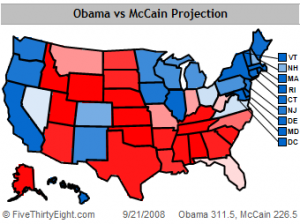Twelve to one: The golden ratio of voting
22Sep2008 posted by: cashless | share this:Reposted from FiveThirtyEight.com
Twelve to one.
For every twelve voters who you talk to at their doors, one voter goes and votes who would not otherwise have voted. If you’re asking: “how can I be most effective in helping my candidate win the election?” then an organizer’s answer is going to be: knock on doors.
In a Yale study by Donald Green and Alan Gerber on the effects of doorknocking in local elections, they concluded that a conservative estimate was that “12 successful face-to-face contacts translated into one additional vote.”
This figure, moreover, is a conservative estimate. When calculating the effects of actual treatment, we regarded any conversation with a member of the household as a “contact.” Only about half of these conversations occurred directly with a subject in the treatment group; the remainder involved urging a housemate to vote and requesting that this message be passed along to the intended subject. Had we restricted the definition of contact to direct conversations with the subject, the apparent effects of canvassing would have been much greater.
Although the study aimed at local elections, the principle is sound. Face-to-face contact is the single most important effort a volunteer can contribute to his or her candidate.
More from —=(] buhbOmp [)=—
- impulse travels. ep469. 12 january 2022.
- impulse travels. ep468. 05 january 2022.
- impulse travels. ep467. 29 december 2021.
- impulse travels. ep466. 22 december 2021.
- impulse travels. ep465. 15 december 2021.
- impulse travels. ep464. 08 december 2021.
- impulse travels. ep463. 01 december 2021.
- impulse travels. ep462. 24 november 2021.
- impulse travels. ep461. 17 november 2021.
- impulse travels. ep460. 10 november 2021.
— SEE ALL POSTS (RETURN TO MAIN PAGE) —
Podcast:
EPISODE 13. DJ LIL TIGER
and EMPANADAMN
DJ LIL TIGER starts things off with a love-themed Soul set with splashes of classic disco and contemporary R&B. EMPANADAMN holds it down in the second half with a mesh of synthy dance, pop, Hip-Hop and electro.
» Download mp3 (62.7MB)
» Subscribe to podcast (RSS)
» Subscribe via iTunes podcast page
» Archive of previous episodes
EPISODE 221. 02 AUG 2016.
» Listen | Download mp3 | Playlist
» Subscribe to podcast: iTunes | ![]() RSS
RSS

Leave a reply